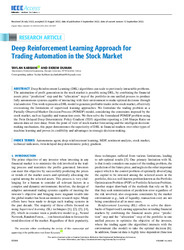Deep reinforcement learning approach for trading automation in the stock market
| dc.contributor.author | Kabbani, Taylan | |
| dc.contributor.author | Duman, Ekrem | |
| dc.date.accessioned | 2023-08-11T12:49:30Z | |
| dc.date.available | 2023-08-11T12:49:30Z | |
| dc.date.issued | 2022 | |
| dc.identifier.issn | 2169-3536 | en_US |
| dc.identifier.uri | http://hdl.handle.net/10679/8644 | |
| dc.identifier.uri | https://ieeexplore.ieee.org/document/9877940 | |
| dc.description.abstract | Deep Reinforcement Learning (DRL) algorithms can scale to previously intractable problems. The automation of profit generation in the stock market is possible using DRL, by combining the financial assets price 'prediction' step and the 'allocation' step of the portfolio in one unified process to produce fully autonomous systems capable of interacting with their environment to make optimal decisions through trial and error. This work represents a DRL model to generate profitable trades in the stock market, effectively overcoming the limitations of supervised learning approaches. We formulate the trading problem as a Partially Observed Markov Decision Process (POMDP) model, considering the constraints imposed by the stock market, such as liquidity and transaction costs. We then solve the formulated POMDP problem using the Twin Delayed Deep Deterministic Policy Gradient (TD3) algorithm reporting a 2.68 Sharpe Ratio on unseen data set (test data). From the point of view of stock market forecasting and the intelligent decision-making mechanism, this paper demonstrates the superiority of DRL in financial markets over other types of machine learning and proves its credibility and advantages in strategic decision-making. | en_US |
| dc.language.iso | eng | en_US |
| dc.publisher | IEEE | en_US |
| dc.relation.ispartof | IEEE Access | |
| dc.rights | Attribution-NonCommercial-NoDerivatives 4.0 International | |
| dc.rights | openAccess | |
| dc.rights.uri | https://creativecommons.org/licenses/by-nc-nd/4.0/ | |
| dc.title | Deep reinforcement learning approach for trading automation in the stock market | en_US |
| dc.type | Article | en_US |
| dc.description.version | Publisher version | en_US |
| dc.peerreviewed | yes | en_US |
| dc.publicationstatus | Published | en_US |
| dc.contributor.department | Özyeğin University | |
| dc.contributor.authorID | (ORCID 0000-0001-5176-6186 & YÖK ID 142351) Duman, Ekrem | |
| dc.contributor.ozuauthor | Duman, Ekrem | |
| dc.identifier.volume | 10 | en_US |
| dc.identifier.startpage | 93564 | en_US |
| dc.identifier.endpage | 93574 | en_US |
| dc.identifier.wos | WOS:000853807800001 | |
| dc.identifier.doi | 10.1109/ACCESS.2022.3203697 | en_US |
| dc.subject.keywords | Autonomous agent | en_US |
| dc.subject.keywords | Deep reinforcement learning | en_US |
| dc.subject.keywords | MDP | en_US |
| dc.subject.keywords | Sentiment analysis | en_US |
| dc.subject.keywords | Stock market | en_US |
| dc.subject.keywords | Technical indicators | en_US |
| dc.subject.keywords | Twin delayed deep deterministic policy gradient | en_US |
| dc.identifier.scopus | SCOPUS:2-s2.0-85137848489 | |
| dc.contributor.ozugradstudent | Kabbani, Taylan | |
| dc.relation.publicationcategory | Article - International Refereed Journal - Institutional Academic Staff and Graduate Student |
Files in this item
This item appears in the following Collection(s)
Share this page




